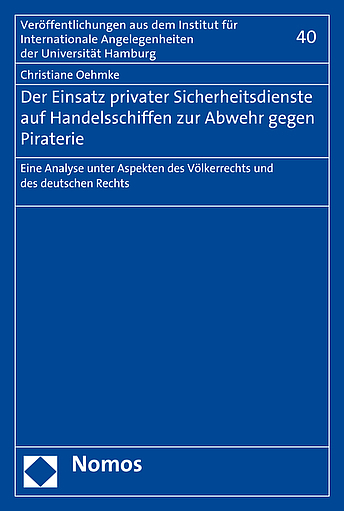englischThis work analyses the complex interplay between international, transnational and national law that governs the use of private security companies (PSCs) in combating piracy. The author addresses the following key questions: What are the rights and duties of PSCs, ship owners and captains as well as those of the nation states involved? Are there legal uncertainties or gaps? How can the regulatory framework be improved? In the analysis, special emphasis is put on the multipolar structure of responsibilities arising from the international law of the sea and international human rights law, complemented by transnational standards and German constitutional, public and penal law.
The work proposes concrete regulatory reforms. At the same time, it makes valuable contributions to fundamental questions concerning human rights law doctrine and the theoretical debate on transnational law. Its comprehensive examination of research material makes this work a treasure trove for anyone interested in the topic.
Auf einer breiten Literaturbasis analysiert die Autorin das komplexe Regime aus Völkerrecht, transnationalen Standards und nationalem Recht, in dem sich der Einsatz privater Sicherheitsfirmen auf Handelsschiffen abspielt. Zentrale Fragen sind: Welche Rechte und Pflichten haben Firmen, Reedereien und Kapitäne sowie die involvierten Staaten? Wo bestehen Rechtsunsicherheiten bzw. -lücken? Wie sollte eine weitergehende Regulierung erfolgen? Im Fokus der Analyse steht das mehrpolige Verantwortungsgefüge, das sich v.a. aus dem Seevölkerrecht und den Menschenrechten ergibt und durch transnationales Recht sowie das deutsche Verfassungs-, Gewerbe- und Strafrecht erfüllt und ergänzt wird.
Die Autorin macht praktische Vorschläge zur Verbesserung der regulatorischen Rahmenbedingungen. Zugleich leistet sie weiterführende Beiträge zu grundlegenden Fragen der Menschenrechtsdogmatik wie zur Theoriendebatte um transnationale Regulierung. Die umfassende Aufbereitung schwer zugänglichen Materials macht die Arbeit zu einer Fundgrube für alle, die sich mit dem Thema befassen.
Die Arbeit wurde mit dem Helmuth-James-von-Moltke-Preis der Deutschen Gesellschaft für Wehrrecht und Humanitäres Völkerrecht ausgezeichnet.


